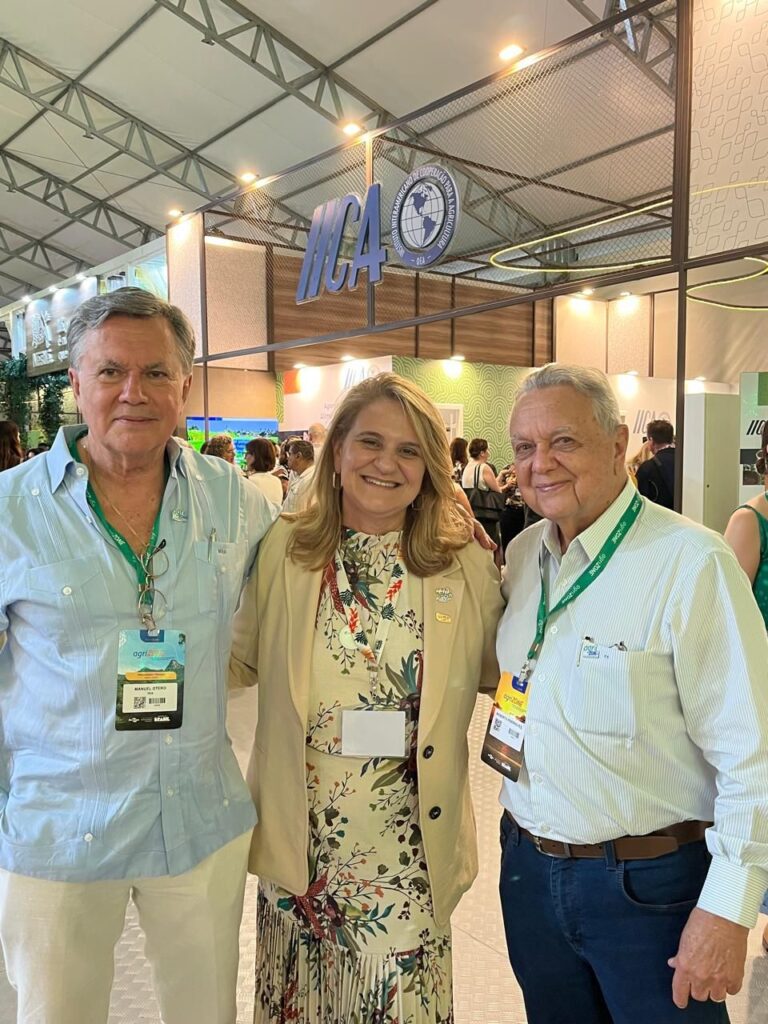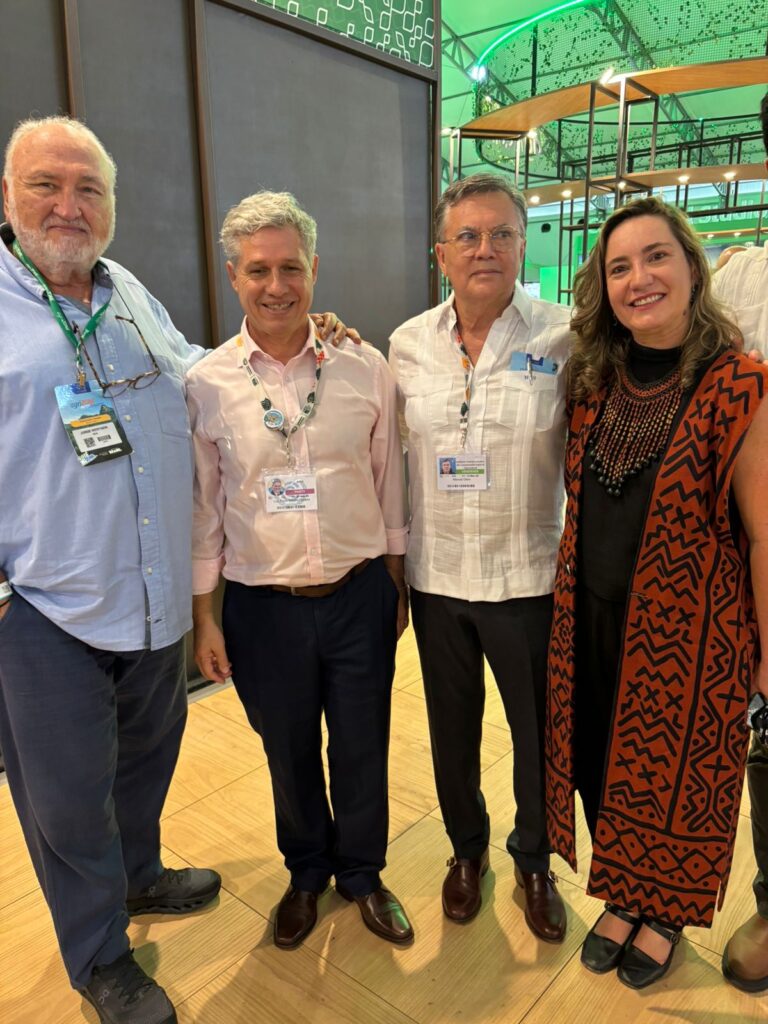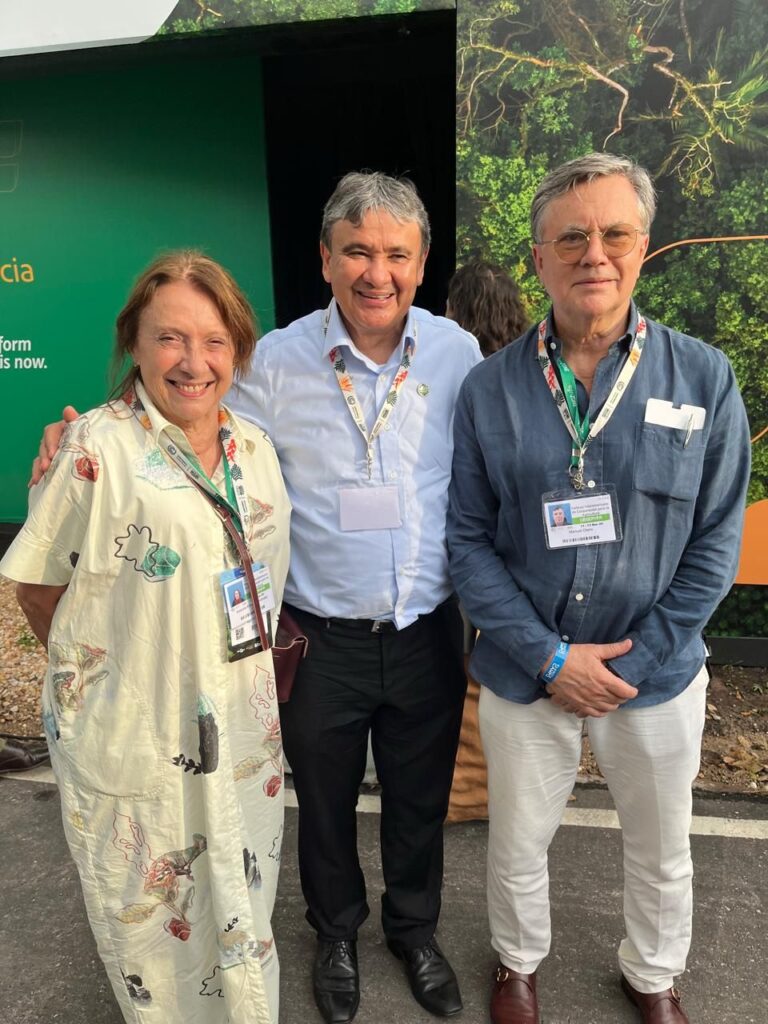
Manuel Otero, Director General of IICA; Silvia Massruhá, President of EMBRAPA; and Roberto Rodrigues, former Minister of Agriculture of Brazil.
Belém do Pará, Brazil, 13 November 2025 (IICA) – The Director General of the Inter-American Institute for Cooperation on Agriculture (IICA), Manuel Otero, highlighted the success of AgriZone, an area established at COP30 to show the world how tropical agriculture has evolved, as one of the most important sources of sustainable food production with tremendous growth potential.
AgriZone is an area established at COP30—the world’s foremost environmental forum—by the Brazilian Agricultural Research Corporation (EMBRAPA) and key partners to spotlight how agricultural production and natural resource protection can advance hand in hand thanks to research and new technologies.
AgriZone houses the pavilion of the Inter-American Institute for Cooperation on Agriculture (IICA) and its strategic partners.
By decision of the Brazilian government and EMBRAPA, this is the first time that a space dedicated specifically to agriculture has been installed at a COP. The IICA Director General considered it important to institutionalize spaces like AgriZone at future COPs to showcase and foster discussions on agriculture’s role in overcoming economic, climate and social challenges.
“The technological displays at AgriZone, here in Belém do Pará, demonstrate that a transformation process is already underway in relation to tropical agriculture. Sustainable tropical agriculture is already a reality and is destined to become, ever more, one of the most important drivers of food production in harmony with the environment, which the world will demand more and more of in the years to come”, explained Otero.

Jorge Werthein, Special Advisor to the Director General of IICA; Paulo Teixeira, Minister of Agricultural Development and Family Farming; Manuel Otero, Director General of IICA; and Ana Euler, Director of EMBRAPA.
At AgriZone, the Director General of IICA, who was joined by his Special Advisor Jorge Werthein, spoke with Paulo Teixeira, Minister of Agricultural Development and Family Farming of Brazil, and Wellington Dias, Minister of Development and Social Assistance, Family and the Fight Against Hunger, among other individuals.
He also attended events with Silvia Massruhá, President of EMBRAPA, a world-renowned Brazilian public institution with which IICA signed a cooperation agreement to foster the incorporation of science and new technologies in Latin American and Caribbean agriculture.
At AgriZone, Otero also met with Henry González, Investment Director of the Green Climate Fund (GCF), with whom he discussed financing alternatives that can serve as incentives for farmers to adopt good environmental practices.
Through its Ministry of Agriculture and Livestock (MAPA) and the Executive Commission of the Cocoa Farming Plan (CEPLAC), and in partnership with IICA, the Brazilian government will implement the project entitled “Climate Change Mitigation and Adaptation through Cocoa Farming Agroforestry Systems in the Amazon and Atlantic Forest Biomes”, with funding from the Green Climate Fund(GCF).
The initiative, which will mobilize a total investment of USD 30.9 million—of which USD 23.1 million correspond to the GCF and USD 7.8 million are co-financed by MAPA/CEPLAC and IICA—will directly benefit more than 69,000 family farmers and indirectly benefit nearly 400,000 people in 26 municipalities in the states of Bahía and Pará, in northeastern and northern Brazil.
Roberto Rodrigues, former Minister of Agriculture of Brazil; Marcello Brito, Executive Secretary of the Legal Amazon Consortium of States; and Izabella Teixeira, former Minister of the Environment of Brazil and IICA Goodwill Ambassador, also participated in various events at AgriZone and the IICA pavilion.
Ambassador André Correa do Lago, President of COP30, stated that “AgriZone’s magnitude and the preparation of this space have shown that Brazil can contribute to food security and environmental conservation. This valuable contribution by Brazil allows for showing the rest of the world that tropical agriculture has achieved extraordinary progress, in a world that is growing and evolving”.
Public-private partnerships
Otero emphasized that this is the fourth consecutive year that IICA and its strategic partners have installed a pavilion at COP—which brings together negotiators, experts, civil society organizations and activists from nearly 200 countries—building on previous experiences in Egypt, the United Arab Emirates and Azerbaijan. The pavilion is called the Home of Sustainable Agriculture of the Americas.
“In this space, IICA and its partners reaffirm the importance of public-private partnerships. I wish to thank all the private sector companies that continue to support us, based on the conviction that international cooperation and the private sector play a role in transforming agrifood systems”, said Otero.
“It is very interesting to be here in this space built at Embrapa’s Eastern Amazon Unit, thanks to the efforts of President Silvia Massruhá and the entire EMBRAPA team. EMBRAPA is an institution that means a great deal to IICA, given its historical ties, its present and its future”, he added.

Amanda Fernández, architect and wife of the IICA Director General; Wellington Dias, Minister of Social Development of Brazil; and IICA Director General Manuel Otero.
The Director General highlighted the importance of the agreement signed with EMBRAPA to implement Radar Agtech, a ground-breaking initiative launched by the Brazilian institution, throughout the entire region. Its goal is to identify and analyze innovations and trends in the agrifood sector, foster dialogue and drive sustainable and inclusive development in agribusiness.
“AgriZone demonstrates the value of tropical agriculture for food security and environmental and natural resource conservation, which can only go hand in hand. The issues of digital agriculture, the bioeconomy and support for small-scale production, which foster harmony between production and the environment, are on IICA’s current agenda and will also be addressed in the future”, concluded Otero.
More information:
Institutional Communication Division.
comunicacion.institucional@iica.int











